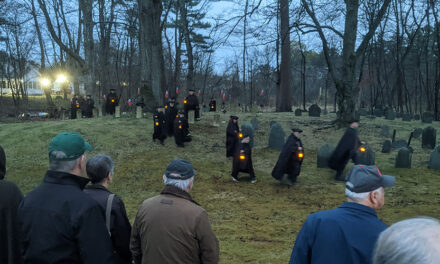Published in the February 24, 2016 edition
By MAUREEN DOHERTY
LYNNFIELD — The state Department of Public Health (DPH) has pointed out numerous deficiencies in the plan outlined by Partners HealthCare on how it will maintain access to “essential” services currently provided to area residents affected by the planned closure of Union Hospital in Lynn.
Sherman Lohnes, director of the Bureau of Health Care Safety and Quality at the state DPH, summarized these deficiencies in his Feb. 16 response to Partners, which operates the North Shore Medical Center (NSMC) campuses in both Lynn and Salem.
Lohnes is particularly interested in more detailed information on the emergency services that will be available to the public currently served by Union Hospital and getting Partners to immediately engage the public and local officials in the planning process.
Partners now has until Wednesday, March 2 to address those parts of the plan outlined in its 13-page response to the DPH that Lohnes has deemed deficient.
As reported in detail by the Villager last week, Partners and NSMC maintain that its plan to consolidate services currently available at Union to its Salem Hospital campus within three years and by renovating and expanding the Salem campus will result in improved delivery of medical care in the region.
The declaration by the state DPH on Jan. 22 that Union Hospital’s services are “essential” to the region set in motion state regulations under 105 CMR 130.122(H) that require Partners/NSMC to create a plan detailing how access to these essential services will be maintained for the public following the discontinuance of service at NSMC in Lynn.
“I was pleased to see that the DPH is listening and making NSMC follow through with the information being requested. I had written to the DPH on February 16 expressing my disappointment to the fact that NSMC did not address any of the major issues I had presented at the public hearing,” Selectmen Chairman Phil Crawford stated to the Villager regarding Lohnes’ response.
“I also requested to be on the committee to study the issues being put together by NSMC,” Crawford added.
Immediate review of emergency services
Lohnes stated in his response to Partners/NSMC that the DPH had requested “information regarding NSMC’s plans to ensure the availability of emergency department services to the residents of Lynn and the surrounding towns.”
Specifically, the DPH has directed Partners to address:
• Concerns raised at the (Jan. 7) public hearing, regarding the availability of emergency services in Lynn and to the surrounding municipalities;
• The impact of the closure of the Union Hospital campus on remaining emergency departments in the area, including but not limited to Salem Hospital;
• Methods under consideration to address transport times to remaining emergency departments in the area;
• The increased time out of services for ambulances during return trips.
Acknowledging NSMC’s statement that it intends to continue its emergency department at Union “while the hospital remains open,” Lohnes wants more detail regarding the “range of options after closure” currently under consideration by NSMC, “one of which is a satellite emergency facility (SEF).”
“In light of the concerns shared by the community at the (Jan. 7) public hearing, the Department anticipates that NSMC will, as part of its public engagement and community update plan as addressed below, immediately initiate its planning process and work with community leaders to establish measurable criteria to be used in making a decision as to the level of services to be offered, and the siting of these services,” Lohnes stated.
Additionally, Lohnes stated, “NSMC must actively engage ambulance services operating in the Union Hospital service area in this planning process.”
The DPH has requested specific plans, if any, by NSMC to provide any emergency services in Lynn post-closure, “including but not limited to establishing a satellite emergency facility (SEF) of Salem Hospital in Lynn.”
Lohnes sated, “The Department believes, that in light of the time that may be necessary to develop an SEF, and as indicated above, NSMC’s review of the emergency service needs of the city of Lynn and those of the surrounding communities should begin immediately in order to allow sufficient time to take action well in advance of the closure of Union Hospital.”
Closer look at travel times
“NSMC should also reconsider its estimated travel times for patients traveling by car to Salem Hospital, and the impact of travel time when making its decision regarding ongoing access to emergency services after the closure of Union Hospital,” Lohnes stated.
In the original response by Partners/NSMC attorney Andrew S. Levine to the DPH, Mapquest was cited as the source of travel time comparison information to both the Union and Salem hospital campuses and other medical centers in the region, with both distances traveled and estimated drive times based on MapQuest’s “center of town to destination” definition, with an assumption of “normal traffic and legal speed limit” being observed.
Lohnes further explained, “While information from MapQuest may provide a consistent method of measurement, it appears these estimates are based primarily on distance, and do not take into account varying traffic conditions resulting from congestion on the roads during peak travel times.”
Ongoing community engagement required
The DPH wants Partners to initiate immediate outreach to community leaders and elected officials on the future plans for the Union site and ongoing access to services. However, Lohne’s pointed out that Partners’ response to the DPH merely indicated its intent to “convene a small group in the summer to discuss access to services,”
Lohnes responded, “The Department expects that NSMC will immediately initiate outreach to community leaders, assess the need for engagement beyond the small group proposed, and provide both the Department and the community with more detailed information regarding NSMC’s timetable for ensuring access to services following closure, and its plans for community engagement, including information on the communities to be represented in any groups organized by NSMC.”
Specific areas of concern raised at the public hearing which Lohnes stated NSMC must address include but are not limited to: access to emergency services, the provision of inpatient services at the Union Hospital campus throughout the closure period, outpatient services, and travel and transportation issues that will result from the closure.
Timely disclosures
As part of the DPH’s declaration that Union’s services are essential to the community, it has required Partners/NSMC to provide both the DPH and the “greater Lynn community” with quarterly updates throughout the closure process, beginning with the first quarter of 2016 (January to March) through the “closure of medical and surgical services at Union Hospital.”
However, Lohnes pointed out in his Feb. 16 letter that NSMC’s response which indicated that those initial quarterly reports would merely “just confirm that services continue to be offered at Union Hospital” is insufficient.
“The Department believes that providing more information to the Department and the community, including information on NSMC’s plans and activity in regard to community engagement, would be appropriate to promote transparency and provide greater opportunity for meaningful and ongoing public input,” Lohnes concluded.




